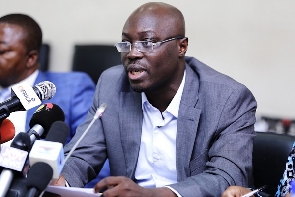Mr Cassiel Ato Forson, former Deputy Minister of Finance and Member of Parliament (MP) for Ajumako /Enyan/Essiam Constituency, has indicated that Ghana has breached its debt servicing threshold and won’t be able to settle its current GH¢200 billion debt.
He said the Akufo-Addo government had increased the public debt, which was GH¢120 billion during the Mahama administration, to almost GH¢200 billion, and is concerned as to how that amount of money would be paid.
He indicated that in the first quarter of the year 2018, Ghana’s public debt increased by GH¢25 billion, from GH¢173 billion to GH¢198.6 billion, which is approximately GH¢200 billion and wonders how it would be paid.
“Mr Speaker, within some few months, we can see an increase in public debt by 25 billion cedis. My concern has nothing to do with the nominal numbers. My concern is ability to service the debt. It is the most important thing that all of us should be mindful of.”
Mr Forson made the comments in the House when the Finance Committee in Parliament presented its report on 2018 Annual Public Debt Management.
The 2018 Annual Public Debt report covers broad debt management operations in 2018, and is intended to enhance transparency in Ghana’s public debt management, as well as updating stakeholders and the general public on key developments in the national debt management front.
It is also to disseminate information on Ghana’s public debt portfolio and debt management activities carried out over the past year, to stakeholders, including lenders and investors in government securities as well as the general public.
The broad areas covered by the report in accordance with the section 72(1) of the Public Financial Management Act 2016 (Act 921) includes borrowing and other government debt management operations, guarantee and lending activities of the government, and other finance arrangements entered into.
It also looks at the debt management strategy and the rational for the strategy, list of outstanding government debts, list of outstanding government guarantees, the amount and beneficiaries of the guarantees, and an assessment of fiscal risk embedded in the guarantees.
Explaining why the country can’t service its debt, Mr Forson said that in order to assess if a country will be able to pay its debt or not, there are four main thresholds, including the present value of debt to GDP ratio and the present value of debt to export ratio.
“Ghana has breached all the four thresholds, and unfortunately, we don’t have enough revenue to be able to service our debt.”
He said: “You don’t pay your debt with your GDP, you pay your debt with revenue, so it’s important for us to be mindful, in as much as we are saying debt to GDP is declining.
“Recent records are showing that we have already spent 70% of the GDP to service our debt, so we are unfortunately getting closer to a time that we will not be able to service our debt.”
He also said that the country’s external debt had increased, but the country has not been able to mobilise enough foreign exchange to rectify the situation.
“Mr Speaker, our external debt is actually increasing, and are not mobilising enough foreign exchange to be able to service this. We have breached the debt service to export ratio, because it’s only through export that you can get the foreign exchange.”
He said that Ghana’s debt situation is high and there is a chance it will not be able to service it, hence, the government should be mindful of its borrowing and spending, and put measures in place to solve the situation.
Business News of Friday, 21 June 2019
Source: asempanews.com













